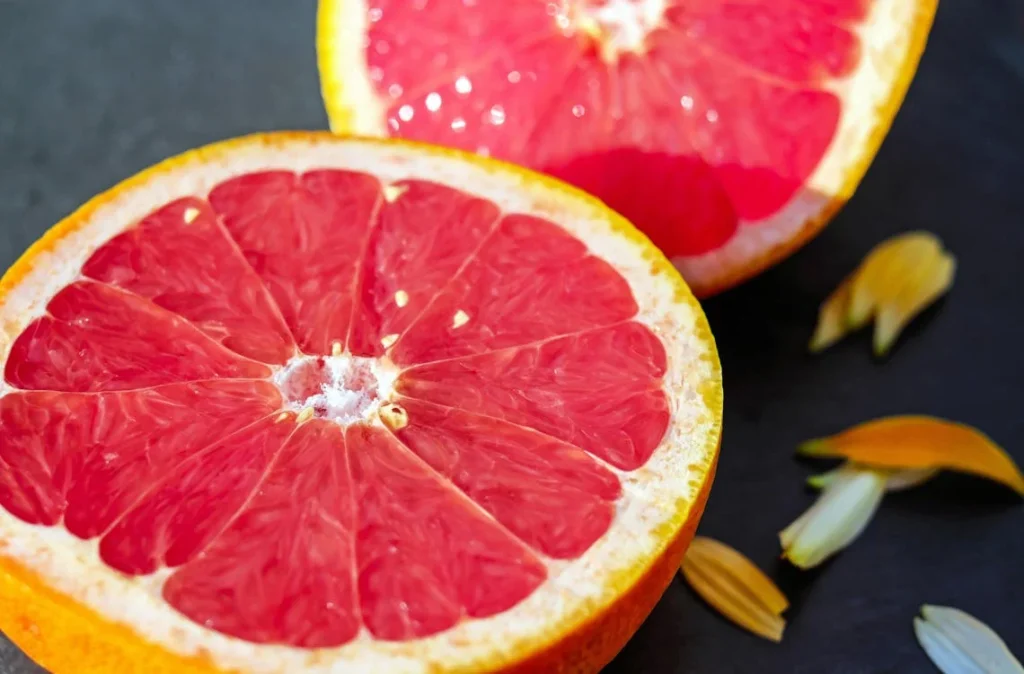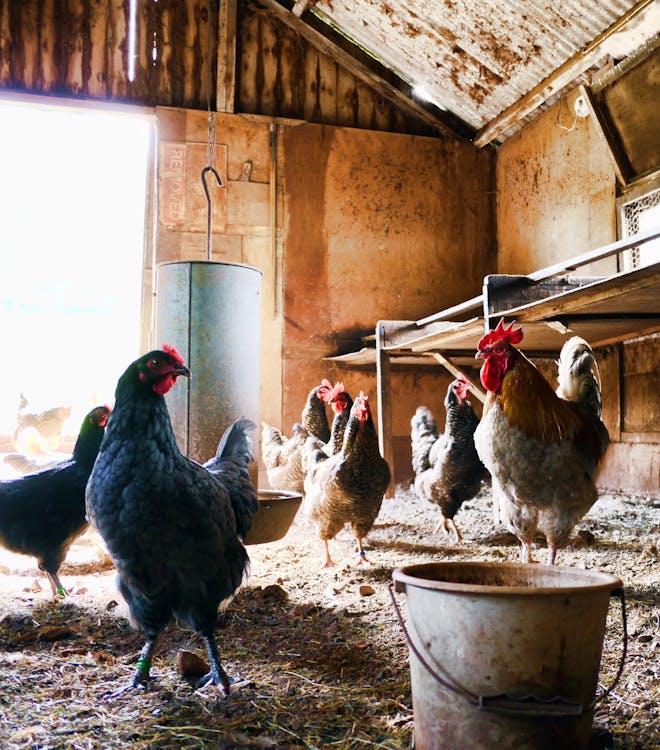Ever wondered if you can share a juicy grapefruit segment with your feathered friends? The answer is yes, chickens can technically eat grapefruit, but with a big caveat – moderation is key. This guide will explore the ins and outs of feeding grapefruit to your chickens, including the potential health benefits, things to watch out for, and how to incorporate it into a balanced diet.
The Benefits Of Feeding Your Chicken Grapefruit
Grapefruit boasts a range of vitamins and minerals that can be a welcome addition to your chicken’s diet in small amounts. Here’s a breakdown of some key benefits:
- Vitamin C Powerhouse: Grapefruit is a champion of Vitamin C, essential for a chicken’s immune system function and overall health. Vitamin C helps fight off infections and promotes healthy tissue growth.
- Antioxidant Advantage: Packed with antioxidants like lycopene, grapefruit can help neutralize harmful free radicals in your chicken’s body, potentially reducing the risk of chronic diseases.
- Hydration Hero: Grapefruit is a juicy fruit, providing much-needed hydration, especially during hot summer months. Keeping your chickens well-hydrated is crucial for optimal health and egg production.
- Potassium Power: This mineral plays a vital role in maintaining proper muscle function and nerve transmission in chickens. Grapefruit offers a natural source of potassium to support these critical functions.
- Digestive Aid (Maybe): Some studies suggest that the citric acid in grapefruit might aid digestion in chickens. However, more research is needed to confirm this benefit definitively.
Things To Watch Out For When Feeding Grapefruit
While grapefruit can offer some health perks, there are potential downsides to consider:
- High Acidity: The main concern with grapefruit is its high citric acid content. Excessive acid intake can irritate a chicken’s sensitive digestive system, leading to diarrhea, lethargy, and decreased egg production.
- Seed Trouble: Grapefruit seeds contain small amounts of a compound called limonin, which can be toxic to chickens in large quantities. While a few stray seeds likely won’t cause harm, it’s best to remove them before offering grapefruit to your flock.
- Sugar Surprise: Grapefruit can be surprisingly high in sugar, especially compared to a chicken’s natural diet. Too much sugar can lead to weight gain and other health problems in chickens.
- Medication Interactions: If your chickens are on any medications, consult your veterinarian before introducing grapefruit into their diet. Grapefruit can interact with some medications, altering their effectiveness.
- Not All Chickens Like It: Chickens have a poor sense of taste, and some might simply reject the bitter taste of grapefruit altogether. Don’t force them to eat it if they’re not interested.
How Often Should You Feed Your Chicken Grapefruit?
Moderation is the golden rule when it comes to feeding grapefruit to chickens. Here’s a guideline:
- Treat, Not Staple: Consider grapefruit a treat, not a regular part of your chicken’s diet. Aim for no more than a few small segments (think an inch or two square) per chicken, once or twice a week.
- Start Slow: If you’re introducing grapefruit for the first time, start with a tiny amount and observe your chickens for any signs of digestive upset. Gradually increase the amount based on their tolerance.
- Monitor Their Health: Keep an eye on your chickens’ droppings and overall behavior after consuming grapefruit. If you notice any changes like diarrhea, loss of appetite, or decreased activity, stop feeding them grapefruit immediately.

How To Prepare Grapefruit for Feeding Your Chicken
Here’s how to safely prepare grapefruit for your feathered friends:
- Wash It Up: Give the grapefruit a good rinse under running water to remove any dirt or pesticides from the peel.
- Segment it Right: Peel the grapefruit carefully, removing all traces of the white pith, which is the bitter layer between the flesh and the peel. The pith contains the highest concentration of citric acid.
- Seed Separation: Cut the grapefruit into bite-sized pieces and remove any visible seeds. As mentioned earlier, even a few seeds can be harmful in large quantities.
- Fresh is Best: Avoid offering grapefruit that’s past its prime or starting to mold. Stick to fresh, firm fruit for your chickens.
Can Baby Chicks Eat Grapefruit?
No, baby chicks (less than 6 weeks old) should not be given grapefruit. Their digestive systems are still developing and highly sensitive. Grapefruit’s high acidity can overwhelm their delicate gut, leading to serious health problems. Stick to a balanced chick starter feed specially formulated for their needs during this crucial growth period.
What Other Foods Can Chickens Eat?
Chickens are omnivores, meaning they enjoy a variety of foods. Here are some healthy and safe options to complement their diet:
- Fruits and Vegetables: A small selection of chopped fruits and vegetables can provide essential vitamins, minerals, and dietary fiber. Good options include chopped apples (minus the core and seeds), blueberries, raspberries, strawberries, leafy greens like kale and romaine lettuce (in moderation due to potential for crop upset), grated carrots, sweet potatoes (cooked), and chopped broccoli florets.
- Kitchen Scraps: You can share some kitchen scraps with your chickens, but be mindful of what you offer. Cooked, unseasoned vegetables like peas, corn, and chopped tomatoes are generally safe. Avoid scraps that are greasy, salty, or spoiled.
- Mealworms and Crickets: These insects are a great source of protein for chickens and can be offered as an occasional treat. You can purchase dried mealworms or crickets from pet stores or online retailers.
- Herbs: Fresh herbs like basil, oregano, mint, and thyme can add some variety and beneficial nutrients to your chicken’s diet. However, introduce them slowly and in small quantities, as strong flavors might overwhelm their senses.

How To Give Your Chicken A Healthy And Balanced Diet
The foundation of a healthy chicken diet should be a good quality, commercially prepared chicken feed formulated for their age and laying status (layer feed for egg-laying hens). This feed will provide all the essential nutrients your chickens need to thrive. Here are some additional tips for creating a balanced diet:
- Fresh Water is Key: Ensure your chickens have access to clean, fresh water at all times. Water is crucial for proper digestion, egg production, and overall health.
- Provide Grit: Grit (small pebbles or crushed rock) aids digestion in chickens by helping them grind up their food. You can purchase grit from farm supply stores or mix it into their feed.
- Offer Variety (In Moderation): While a balanced feed is essential, supplementing with small amounts of fruits, vegetables, and other treats can enrich your chicken’s diet and provide them with mental stimulation while they forage.
- Observe Their Eating Habits: Pay attention to how much your chickens are eating and adjust their feed portions accordingly. Overfeeding can lead to obesity and other health problems.
Final Verdict
Grapefruit can be a refreshing and nutritious occasional treat for your chickens, but it should be offered sparingly and with caution. The high acidity can irritate their digestive system, and the seeds contain potentially harmful compounds. If you choose to share grapefruit with your flock, prioritize their well-being by following the preparation and feeding guidelines outlined above. Remember, a balanced diet formulated for chickens is the cornerstone of their health, and grapefruit should be viewed as a delightful, occasional extra.
For any significant changes to your chicken’s diet, it’s always a good practice to consult with a veterinarian to ensure it aligns with their specific needs and health conditions.

